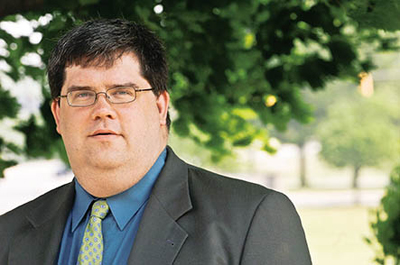

Q&A
Keeping Alumni Connected
Alumni have affiliations with the University that go beyond class years or academic programs, says Rochester’s new executive director of alumni relations, and he hopes to explore ways to strengthen those ties.
As this fall’s season of alumni celebrations kicks into high gear, the University organization that oversees alumni programming and services has a new director.
Kevin Wesley joined the University this spring as executive director of alumni relations, a role designed to be broader than previous incarnations for the University. He most recently was assistant vice president for university advancement and deputy director of alumni relations at Carnegie Mellon University.

ALUMNI RESOURCE: “Alumni are an important resource for any great university,” says Kevin Wesley, Rochester’s new executive director of alumni relations.
Most visibly, he and his staff coordinate and carry out the planning for Meliora Weekend each fall, but they also are working with a wide array of offices and individuals at the University to develop alumni relations programs to better serve Rochester’s roughly 90,000 alumni across the country.
Wesley, a graduate of Bowdoin College who served as editor of the student newspaper there, has more than nine years of experience in both public affairs and alumni relations at Bowdoin and Carnegie Mellon. He talked with Scott Hauser.
How is your role different from that of previous alumni relations leaders?
I’ve been offered an extraordinary opportunity to rethink how alumni relations is carried out at the University. When Senior Vice President and Chief Advancement Officer Jim Thompson asked me to take this job, he charged me with taking alumni relations in some new directions. For one, we are going to think about how to best serve the entire alumni population across all of the University’s schools and programs.
We are also planning to provide services and programs not only in traditional segments such as by class year or by geography, but also based on where people are in their lives. For example, we’d like to think more carefully about what we can provide to alumni who are empty-nesters for the first time, or about to retire, or want to buy their first home and start a family, or are trying to navigate the complexities of applying to college.
Can alumni expect changes?
In the coming months, we will be expanding a number of our offerings, beginning with a broader array of regional programming. In addition, we will create more opportunities for alumni to become involved and stay connected, both with the University and each other, through various online offerings and through expanded networking events. As we tap into the resources and expertise of the College, Medical Center, Eastman School, Simon School, and Warner School, we will look for ways to provide alumni with win-win experiences. They should be able to connect with the campus community where they studied and the broader University community.
Does Rochester present unique challenges because of its decentralized nature?
I think the challenge lies in having such strong school-based identities. Students and alumni identify themselves as being an “Eastman” student or a “Simon” alumna.
What I hope to accomplish, over time, is to create an alumni relations program that helps people identify themselves as being a part of the University of Rochester as well and begin to appreciate the value of their affiliation with the University.
Part of my responsibility is to make connections among those components and share them with all alumni, whether in their hometowns, online, or on campus for Meliora Weekend.
Speaking of Meliora Weekend, do you have new plans for the celebration?
There’s a tagline for Meliora Weekend that really resonates with me—Celebrating the Values of an Educated Life. I don’t know of any other university or college that combines so many varied events—Homecoming, Family Weekend, Reunion Weekend—with a top-flight program of symposia and panel discussions about some of the most important issues facing the world.
The weekend will continue to grow. This year, Simon School alumni will be holding an all-classes reunion, and we are already in preliminary conversations about Meliora 2008, when the Eastman School will hold its biennial Eastman Weekend for alumni. We may not ever have singular themes for Meliora Weekend, but we will start to have some interwoven threads that can touch on many parts of Rochester.
In the future, I would like to involve even more members of reunion classes, more faculty, and parents in our programming as well.
What attracts you about working with alumni?
I had a wonderful college experience myself and believe that universities can play a transformative role in society. And universities need to evolve, to respond to the inevitable changes that occur in the world by preparing our students for the challenges they will face as individuals, as colleagues, and as leaders.
Part of my task is to help alumni remain connected to their University, not just to fondly recall their time as students, which is important, but also to understand how their alma mater has evolved. Alumni are an important resource for any great university.
Today’s students are here in no small part because of the work of preceding generations of alumni whose support and commitment made Rochester what it is. And when today’s students become alumni, they will provide the support and guidance that will help shape the University for future generations. It’s a wonderful cycle.
